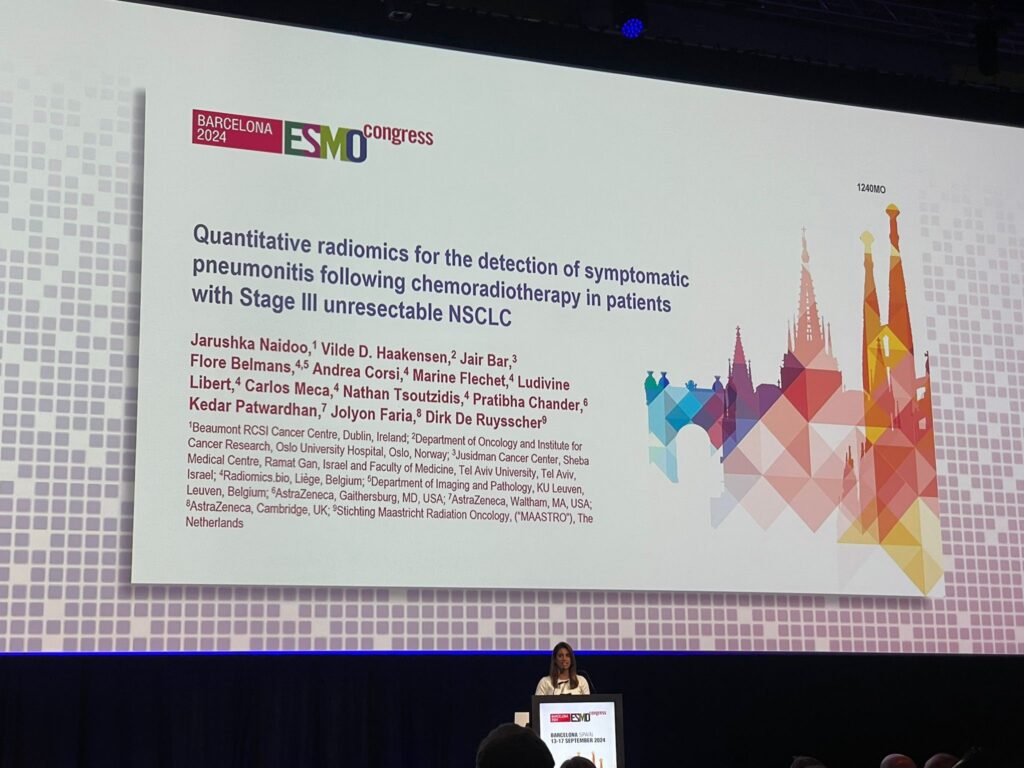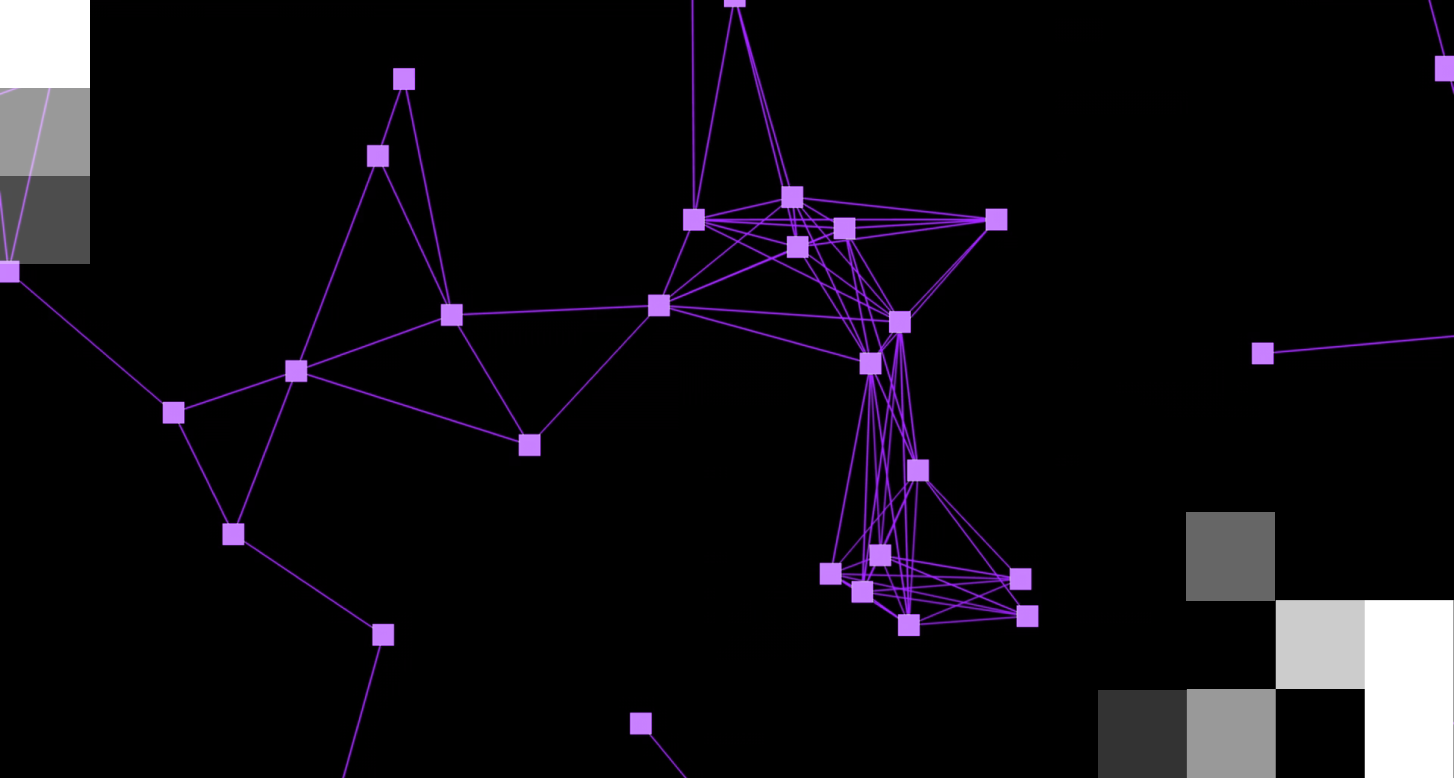Interstitial Lung Disease (ILD)/pneumonitis is a known adverse event associated with cancer treatments including chemotherapy, targeted therapy, immune checkpoint inhibitors, antibody–drug conjugates and radiotherapy.1 It is a potentially fatal condition and can diminish the quality of life for people with cancer, lead to discontinuation of treatment and increase health care costs. On average, direct costs associated with ILD can add up to $32,834 per patient annually (ranging from $1,824 to $116,927).2 It is a relatively common adverse event; for example, between 15-40% of patients receiving concurrent chemoradiation therapy for non-small cell lung cancer (NSCLC) will experience symptomatic radiation pneumonitis.3
To address this healthcare challenge, AstraZeneca has commissioned radiomics.bio to explore the potential of leveraging past clinical trial data and Real-World Evidence, in combination with radiomic imaging data, to develop Artificial Intelligence (AI) models capable of detecting and predicting when a patient may be at high-risk of ILD/pneumonitis. Promising initial results from the study, called LECOMTE, were presented at the European Society for Medical Oncology Congress in September 2024 and showed how a model trained on Phase III clinical trial data for an AstraZeneca immunotherapy in NSCLC was able to successfully identify symptomatic pneumonitis with promising discriminative power.4 This project is fully funded by AstraZeneca.

“AstraZeneca is committed to improving cancer outcomes and patients’ experience of treatment, as we work towards our bold ambition to one day eliminate cancer as a cause of death. We hope that the findings of the LECOMTE study will allow clinicians to more accurately identify NSCLC patients who are at higher risk for ILD/pneumonitis. Our ongoing collaboration with radiomics.bio has shown promising results which we plan to further expand and validate,” stated Ignacio Diaz Perez, Head of Immuno-oncology Lung Medical Affairs at AstraZeneca.
AI technologies have the capability to improve the management of patients at high-risk of ILD/pneumonitis, enhance quality of life and reduce healthcare costs. Radiomics unveils the underlying biology of tumors, providing a comprehensive insight into immune response, inflammation and cellular processes. This provides immeasurable value in understanding the interaction between treatment, tumor biology and adverse events, thus providing a means to enhance patient care through optimized diagnosis, management and decision-making.5
“Quantitative image analysis is a powerful tool that can enhance the understanding of cancer prognosis and treatment response. We are thrilled to collaborate with AstraZeneca to explore how radiomic features, combined with clinical information, can allow for an earlier detection and prediction of cancer treatment-related adverse events. We believe data-driven innovation is the key to truly improving patient management and putting patients on the right trajectory to increase their chances of survival,” stated Wim Vos, CEO radiomics.bio.
__________________________________________________________________________________
About radiomics.bio:
radiomics.bio is an AI-powered medical imaging and advanced statistics clinical research organization, optimizing the development of new oncology treatments. radiomics.bio supports biotech and pharma companies in all stages of clinical development offering services including disease characterization, dose impact quantification, response evaluation, image biomarker identification and outcome predictions. With radiomics.bio you can quantify response for objective decision making, obtain early insights from clinical trials, explore and validate drug mechanisms of action, and increase your understanding of disease on a patient, organ, or lesion level for insight-based decision making. For more information visit www.radiomics.bio.
About AstraZeneca:
AstraZeneca (LSE/STO/Nasdaq: AZN) is a global, science-led biopharmaceutical company that focuses on the discovery, development, and commercialisation of prescription medicines in Oncology, Rare Diseases and BioPharmaceuticals, including Cardiovascular, Renal & Metabolism and Respiratory & Immunology. Based in Cambridge, UK, AstraZeneca’s innovative medicines are sold in more than 125 countries and used by millions of patients worldwide. Please visit astrazeneca.com and follow the Company on social media @AstraZeneca.
Contact info:
radiomics.bio
T: +32 4 72 71 46 79
References:
- Zhou C, Deng H, Yang Y, Wang F, Lin X, Liu M, Xie X, Luan T, Zhong N. Cancer therapy-related interstitial lung disease. Chin Med J (Engl). 2025 Feb 5;138(3):264-277. doi: 10.1097/CM9.0000000000003149. Epub 2024 Oct 11. PMID: 39402974; PMCID: PMC11771665. Available at: https://pmc.ncbi.nlm.nih.gov/articles/PMC11771665/ (accessed July 2025)
- Wong AW, Koo J, Ryerson CJ, Sadatsafavi M, Chen W. A systematic review on the economic burden of interstitial lung disease and the cost-effectiveness of current therapies. BMC Pulm Med. 2022 Apr 20;22(1):148. doi: 10.1186/s12890-022-01922-2. PMID: 35443657; PMCID: PMC9020025.
- Palma DA, Senan S, Tsujino K, Barriger RB, Rengan R, Moreno M, et al. Predicting radiation pneumonitis after chemoradiation therapy for lung cancer: an international individual patient data meta-analysis. Int J Radiat Oncol Biol Phys. 2013 Feb 1;85(2):444–50.
- Naidoo J, Haakensen VD, Bar J, Belmans F, Corsi A, Flechet M, et al. 1240MO Quantitative radiomics for the detection of symptomatic pneumonitis following chemoradiotherapy in patients with stage III unresectable NSCLC. Ann Oncol. 2024 Sep 1;35:S794.
- Delasos L, Khorrami M, Viswanathan VS, Jazieh K, Ding Y, Mutha P, et al. Novel radiogenomics approach to predict and characterize pneumonitis in stage III NSCLC. Npj Precis Oncol. 2024 Dec 24;8(1):1–12.





